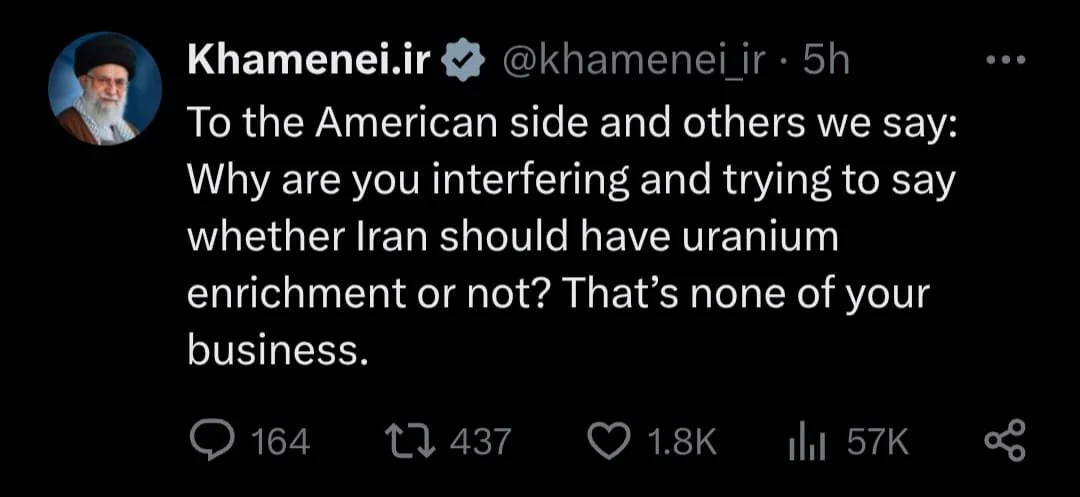‘None of your business’: Khamenei rejects US terms in nuclear talks
The Iranian leader’s defiant statement underscores a shifting stance in Tehran amid a growing distrust of American diplomacy
NEWS ANALYSIS
June 4, 2025
AMID a renewed diplomatic push by Washington to re-engage Tehran over its nuclear ambitions, Iran’s Supreme Leader Ayatollah Ali Khamenei has issued a striking rebuke of American intentions, suggesting that the current negotiation framework is not only flawed but fundamentally incompatible with Iran’s national interests.
In a rare direct intervention via X (formerly Twitter), Khamenei accused the United States of attempting to dismantle Iran’s nuclear sovereignty. “The US’s proposal is 100 per cent against the spirit of ‘We can’,” he wrote, invoking a longstanding national slogan that reflects the Islamic Republic’s ethos of resilience and self-sufficiency. “What the US is demanding is that you should have no nuclear industry at all and be dependent on them.”
Ayatollah Khamenei’s comments reflect a broader hardening of sentiment within Iran’s political establishment. They also signal that the country’s leadership is increasingly disillusioned with Western diplomacy — an outlook shaped by years of perceived betrayal and broken promises. His most forceful remarks came in a broader rhetorical attack on American nuclear hypocrisy: “You Americans possess atomic bombs and have the massive destruction of the world at your disposal. What business is it of yours whether the Iranian nation should or shouldn’t have uranium enrichment or a nuclear industry?”
Such language goes beyond political posturing. It suggests a deliberate escalation in Iran’s messaging strategy, likely intended to project strength both to domestic audiences and regional adversaries. Tehran is signalling that it will not be dictated to, particularly by a nation it views as historically unreliable and fundamentally opposed to its independence.
Since the collapse of the 2015 Joint Comprehensive Plan of Action (JCPOA) under then US president Donald Trump in 2018, Iran’s nuclear programme has advanced considerably. Trump, having returned to office, has reportedly intensified efforts to strike a fresh agreement. But Khamenei’s recent outburst casts doubt on the viability of any such deal, at least in the near term.
Iran has already achieved uranium enrichment levels of 60pc — a technical leap that brings it uncomfortably close to the 90pc threshold required for weapons-grade material. While Iran continues to insist its nuclear ambitions are peaceful, the technological milestone cannot be ignored. Western powers increasingly fear that Tehran is edging towards the point of no return.
Adding to the instability is the wider regional context. Tensions have surged across Asia following a brief but significant military exchange between India and Pakistan in May. Iran’s longstanding rivalry with Israel, which has repeatedly signalled its willingness to strike Iranian nuclear facilities pre-emptively, further fuels Tehran’s perception of encirclement.
Within this volatile landscape, nuclear deterrence may be viewed in Tehran not as a provocation, but as a necessary safeguard. The calculus is shifting: Iran may be preparing to abandon the ambiguous middle ground of nuclear latency in favour of a more definitive strategic posture.
The challenge for Western negotiators — particularly the United States — will be to prevent a complete collapse of diplomacy while contending with increasingly entrenched positions on both sides. With mutual trust at an all-time low and regional dynamics evolving rapidly, the prospect of a nuclear-armed Iran is no longer a distant threat but an imminent geopolitical reality.

